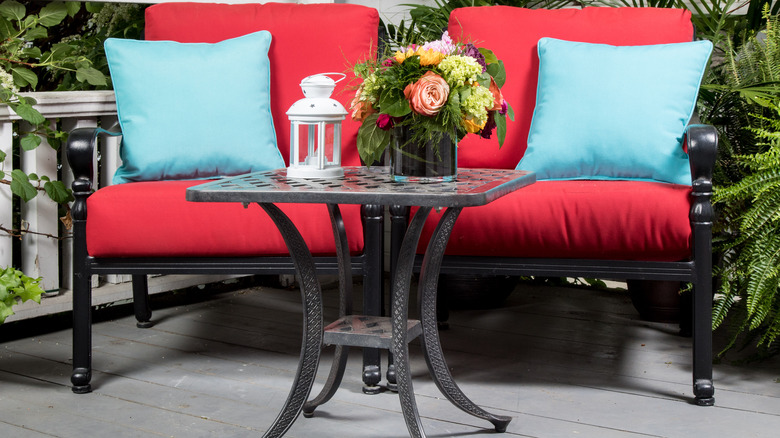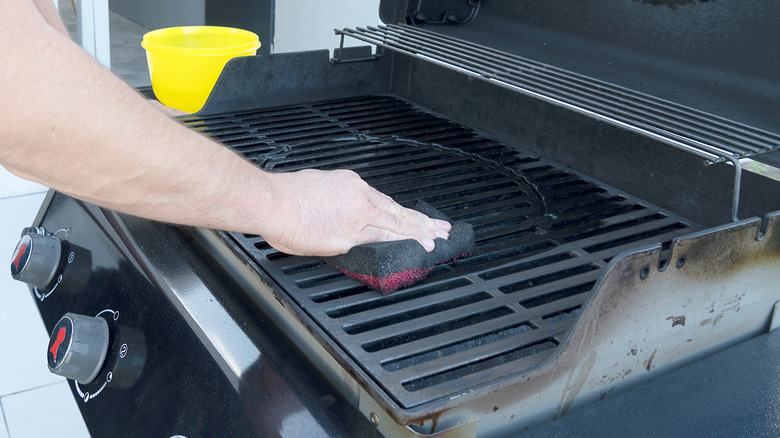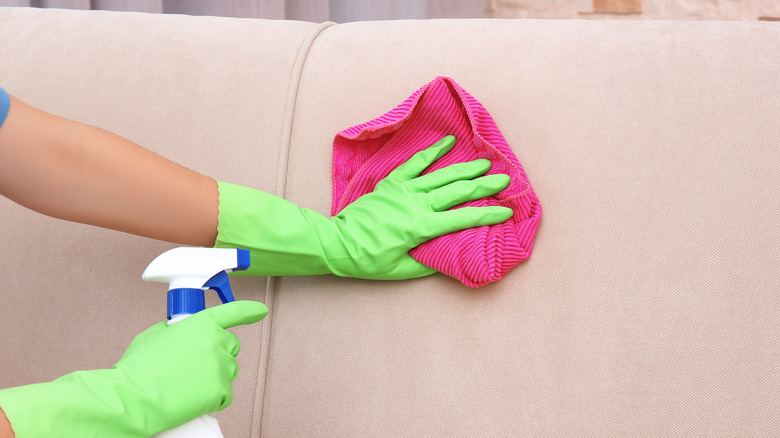The Most Important Place To Use Dish Soap That You're Probably Missing
Commonly used for cleaning a sink full of dirty dishes, dish soap is a necessity for daily life. One of the most significant things about dishwashing liquid is that you can use it to clean almost anything. Moreover, regardless of which brand of dish soap you prefer, they are all made to break down oil and grease on grimy surfaces. Often underestimated as an everyday household cleaner, dish soap has an impressively foaming formula that consists of surfactants that break up surface contaminants while remaining gentle on the skin, and has been used to remarkably assist wildlife affected by oil spills for years, per Proctor & Gamble. From mopping floors to cleaning laundry and appliances, including jewelry and personal grooming, one important place that you may have missed is to use it for cleaning your outdoor patio equipment.
Made from animal and vegetable fats mixed with alkaline salts, soap initially emerged in the time of the ancient Egyptians and Babylonians. According to Getapkmarkets, with its near absence throughout the Dark Ages, the basic need for soap was only commonplace by the 19th century. In 1949, dishwashing liquid re-emerged with Proctor & Gamble's Joy brand along with others that soon followed. Dish soap is a detergent, or synthetic cleaning agent, that specializes in degreasing and refreshing, especially on frequently used barbeque grill parts and weathered patio furniture. Keep reading to learn how to use dish soap to clean your outdoor items!
How to use dish soap to de-grease your grill
Cleaning your grill regularly is vital for your health as well as the appliance's performance. Often utilized more often during the summer months, it's very important to clean your grill after each use, including removing food particles from the grates with a stiff brush or scraper. According to Take a Yard, if remnants are left too long carbon deposits can build up, potentially causing cause food poisoning. Grease build-up can also hinder the grill from lighting up or even cause a flare-up. Make sure to empty the drip pan after each use and remove ash and bricks (after cooling) to prevent blockage.
Give your grill a thorough cleaning by filling a sink or tub with hot water, adding an ample shot of dish soap, and letting the grates soak for up to an hour. For a deeper clean, scrub with a non-scratch grill brush then rinse and let dry. Do the same thing with your grill utensils. To scrub the grill interior, squirt some dish soap into a bucket of hot water and scrub the inside of the grill with a scouring pad until clean. You might also spray a homemade soap and water solution on gunky areas and let sit for about 20 minutes as grease and particles release, suggests Home Made Simple. Simply mix 1 teaspoon of dishwashing soap with a cup of water in an 8-ounce spray bottle.
How to clean your patio furniture with dish soap
You can also use your favorite dish soap to revitalize your patio furniture. Depending on the type of outdoor furnishings you have, dish soap effectively cleans plastic, metal, wrought iron, resin, and stainless-steel pieces. With metal items, oxidation and rust is always a concern. According to My Domaine, using a gentle dish soap solution will help clean your iron pieces without damaging the finish. Mix 1/4 cup of clear dishwashing liquid with a gallon of warm water while and clean using a non-abrasive sponge, brush, or tool of your choice.
To freshen up your outdoor patio cushions, pillows, or umbrellas, you can scrub or spot-clean the material with mild dish soap. Use the soap solution either by spritzing or applying it with a sponge or cloth. You can also apply the soap directly onto the material for a more concentrated wash. Always check the tag or label for specific cleaning instructions on your fabrics, warns Lowe's Home Improvement. Additionally, avoid machine-washing your cushions, especially with dish soap, as it will become too sudsy within the machine. To remove or alleviate stubborn stains, dish soap can also be combined with other cleaning solvents, there are various solutions that work well, like one part soap with three parts hydrogen peroxide or combining equal parts of dish soap with vinegar.


